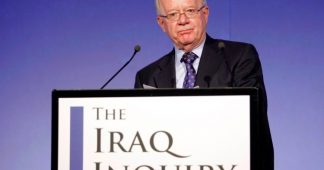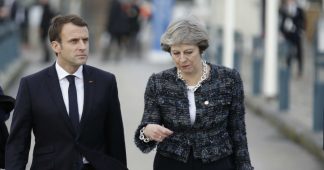Even with the benefit of hindsight, the former British prime minister appears to feel no remorse for his country’s role in fuelling crises in Libya and Syria
By Jonathan Steele
25 September 2019
When it comes to his record of policymaking in the Middle East, former British Prime Minister David Cameron turns out to have been even more naive, moralising and reckless than Tony Blair.
Given the enormity of the catastrophe that Blair – alongside his metaphorical big brother, US President George W Bush – inflicted on Iraq with their ill-judged invasion in 2003, this may seem a bold accusation. But it’s official: look no further than Cameron’s newly issued memoir For the Record.
Commentary on the book has largely centred on Brexit and Cameron’s negative perception of Prime Minister Boris Johnson, but the passages on the Arab Spring and the UK’s role in Libya and Syria are a devastating, and apparently unconscious, admission of guilt.
Worse than the Iraq War
Cameron displays the same confidence in his own decision to go to war that Blair showed when he went into Iraq to topple Saddam Hussein in 2003. But in Cameron’s case, it was worse.
Blair was not faced with any recent disastrous interventions in the Middle East by Western powers that might have served as a warning before he took the plunge. You would have to go back half a century, to the Suez invasion of 1956. Cameron, by contrast, had the still-unfolding Iraq tragedy in front of him when he and former French President Nicolas Sarkozy authorised air strikes on Libya in 2011.
But Cameron doesn’t see Iraq as a disaster; after all, he voted for the invasion when it was put to the British parliament in March 2003, and in his book, he sneers at his coalition partners, the Liberal Democrats, as “Iraq-war-obsessed”.
A few months after the Libya intervention, Cameron was on the warpath again in Syria, proudly boasting in his book of his role in turning a homegrown uprising into an international proxy war. Having decided to give military aid, equipment, training and intelligence to the anti-Assad rebels, he discloses that the aim of his visit to the UAE and Saudi Arabia in November 2012 was “to move them towards supporting the rebels”.
Blair’s belligerence over Iraq was powerfully motivated by his desire to go along with whatever Bush was planning to do, thereby putting flesh on the bones of Britain’s self-appointed status as Washington’s most reliable ally. Cameron was different: Far from being America’s poodle, he frequently complains of former US President Barack Obama’s dithering, noting that “Obama’s handling of [Syrian President Bashar] Assad is what I most regret about his presidency”.
One example he cites is the four days Obama took to return Cameron’s call, after he rang the White House to discuss what course of action to take after chemical weapons were used in Ghouta in August 2013.
The macho and ignorant leader
But it wasn’t just the US president’s hesitation that upset him. “We had to get the [British] generals out of their Iraq and Afghanistan mindset,” he writes.
The phenomenon of the macho and ignorant civilian leader being restrained by experienced military professionals is an old trope in Western decision-making. Cameron fits the scenario in spades. He makes no mention of having ordered impact assessments from his military and political staff before committing the UK to join in the Libyan and Syrian civil wars.
What political, tribal, sectarian and other forces would be unleashed in either country if their strongman rulers were toppled? The question was not asked by Cameron. All he wanted to know was whether the British military had enough assets to succeed in removing Assad.
“Our military and security services were on this issue a huge source of frustration … David Richards [former chief of the defence staff] and John Sawers [former head of the secret intelligence service, MI6] offered their cold calculus: that what we had in our toolkit could not guarantee the outcome we wanted. ‘Maybe it’s just a wicked problem that cannot be solved’ was the gist. ‘We might make things worse, Prime Minister,’ I was told. ‘How can we make things worse than a dictator murdering his people?’ I would say, exasperated.”
Cameron then did what Bush and Blair had done over Iraq. He started to listen to exiles, forgetting they had axes to grind and would be tempted to exaggerate the unpopularity of the dictator and the ease with which he could be overthrown. “Sometimes I felt that I picked up more from odd members of the diaspora I’d meet than I did from our diplomats,” Cameron confesses.
Foolish advice
On one occasion, Cameron did follow the Foreign and Commonwealth Office’s advice, though it turned out to be foolish.
He reveals that on a trip to Cairo 10 days after former Egyptian President Hosni Mubarak’s resignation, he met pro-democracy activists and bloggers, but on the advice of Dominic Asquith, then the British ambassador, he deliberately chose not to see representatives of the Muslim Brotherhood.
Here was one of the main political movements in Egypt, which was to win the country’s first and only democratic election for the presidency a year later – and Cameron was boycotting it. “Far from instigating the uprisings, the Islamists had been surprised by them and were now trying to turn them to their advantage. We shouldn’t assist them,” he writes.
Cameron’s views on how to deal with authoritarian regimes were infused with simple moralising, as was Blair’s. There was a famous occasion in November 2002 when Downing Street invited six academic experts to brief Blair on the complexity of Iraqi politics. They explained that Iraq was full of tremendous inter-communal resentments and that Iraqis were proud nationalists who would not welcome being occupied by Western armies.
Blair’s response stunned them. He was obsessed with one point only. “But the man’s uniquely evil, isn’t he?” he told the academics.
Cameron’s view of Assad and Syria is similar to Blair’s of Saddam Hussein and Iraq. Cameron repeatedly refers to Assad’s brutality and massacres. Only once does he appear to recognise that a civil war is underway in Syria; that Britain, France, and the US and their Gulf Arab allies are helping to stoke it by arming Sunni rebels; and that the Syrian president is bound to resist with all necessary means.
Arming Syrian rebels
Cameron reports a visit he paid to Russia in May 2013 to see President Vladimir Putin and propose a ceasefire and the appointment of a transitional unity government that would lead to Assad’s replacement. The idea failed. Cameron was more committed to achieving military advances by the rebels, having already escalated the war in March 2013 when he persuaded the EU to lift an embargo on supplying them with arms.
The policy was unpopular with the British public, but Cameron totally underestimated people’s wish not to have Britain intervening in yet another war in the Middle East. He was shocked when parliament voted against air strikes on Damascus in August 2013.
Like Blair, Cameron was prone to false analogies, citing Rwanda and Bosnia as examples of the West’s failure to intervene to stop massacres. He argued that it should not be repeated in Libya and Syria.
There are breathtaking gaps in his narrative. It’s widely accepted that Britain and France wanted regime change in Tripoli, but disguised the purpose of their air strikes as only intended to protect civilians in Benghazi, when in fact the imposition of a no-fly zone gave them the opportunity to destroy former Libyan leader Muammar Gaddafi’s tanks and artillery pieces.
Britain and France wanted to become, in effect, the anti-Gaddafi rebels’ air force. A pretext needed to be found to justify intervening, so Cameron gave repeated public warnings that the people of Benghazi would be massacred by Gaddafi’s approaching army unless Britain and France intervened.
Yet, nowhere in his book does Cameron mention any suggestion that a serious analysis of the Benghazi massacre scare should have been taken before air strikes were launched. As Alison Pargeter, a well-known expert on Libya, told the House of Commons foreign affairs committee in 2015: “Gaddafi had already retaken other towns in the east. There had been no large-scale massacre there.”
Repeating mistakes of the past
Was Cameron really unaware of the thinness of the massacre scare, or is he dissembling in his book and deliberately disguising his government’s tactics? Were he and Sarkozy oblivious to the consequences?
The Russians were taken in by the Anglo-French promises that the aim of the proposed intervention was strictly limited. They abstained when the UN Security Council voted to authorise the imposition of a no-fly zone. This Anglo-French cheating over Libya had huge consequences, as it made the Kremlin leery of all subsequent Western calls for intervention in Syria.
Yet, Cameron writes: “It’s a mystery why Russia did not vote against [the UN resolution].” That is disingenuous in the extreme. British and French diplomats at the UN in New York assured their Russian counterparts that the aims of the Libyan intervention were purely humanitarian.
With the benefit of hindsight, even as Libya is still riven by factional fighting between regional militias and warring authorities, Cameron appears to feel no remorse. Nor does he make any effort to understand why Western military interventions in the Middle East almost never succeed in achieving their objectives, instead sticking by the phoney massacre scare and his simplistic something-must-be-done mentality. “I will be relieved to my dying day that we chose to stop Gaddafi from reaching Benghazi,” he writes.
After the disaster of the Iraq War, one of the questions that dominated the Chilcot inquiry into Blair’s decision-making was key: will politicians learn from their mistakes? With his interventions in Libya and Syria, Cameron made Blair’s mistakes all over again.
The views expressed in this article belong to the author and do not necessarily reflect the editorial policy of Middle East Eye.
* Jonathan Steele is a veteran foreign correspondent and author of widely acclaimed studies of international relations. He was the Guardian’s bureau chief in Washington in the late 1970s, and its Moscow bureau chief during the collapse of communism. He was educated at Cambridge and Yale universities, and has written books on Iraq, Afghanistan, Russia, South Africa and Germany, including Defeat: Why America and Britain Lost Iraq (I.B.Tauris 2008) and Ghosts of Afghanistan: the Haunted Battleground (Portobello Books 2011).
Published at https://www.middleeasteye.net/opinion/camerons-memoir-admission-guilt-devastating-middle-east-policies











